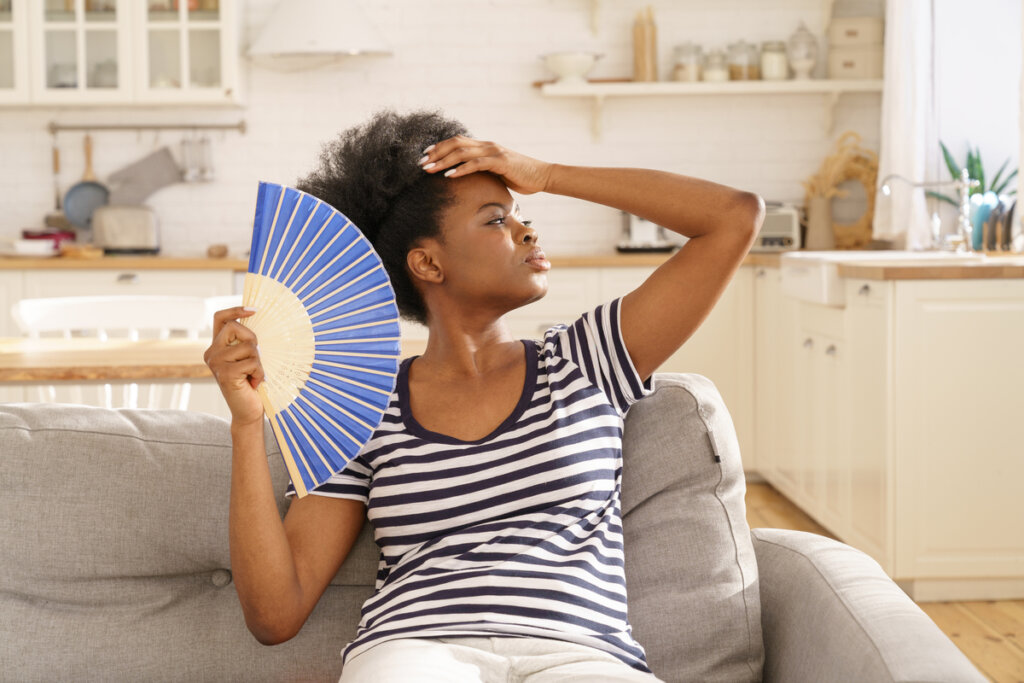Summer Anxiety: Why it Occurs and How to Manage it

Relaxation, vacations, and fun go hand in hand with the arrival of the warm weather. However, some people suffer from anxiety in summer, but not during the rest of the year. Why does this happen?
It’s clear that the environment influences our mood. This is especially evident in those people who don’t manage very well in high temperatures. As a matter of fact, there are some people who are more sensitive than others to changes in the weather. This is commonly known as meteosensitivity.
If, with the arrival of summer you feel like your mood worsens and you start to feel anxious, in this article we’ll explain why it happens. Also, what you can do to manage it.
Summer anxiety, why does it happen?
Extreme heat has an effect on mental health. This is more apparent in conditions such as bipolar disorder, depression, or chronic stress. Nevertheless, high temperatures always affect people’s moods. In this sense, those who live in large cities tend to be the greatest victims of summer anxiety.
Some of the symptoms that are aggravated by high temperatures are confusion, insomnia, sweating, fatigue, irritability, aggressiveness, difficulty concentrating, and decreased performance.

Other factors that increase the chances of suffering from anxiety at this time of year are the following:
- During heatwaves, your body works to maintain your body temperature in the range that its systems function best. Therefore, your brain devotes more energy to this than to the processes of your emotional regulation and cognitive performance.
- In summer it’s more difficult to fall asleep. This makes you feel tired even when you haven’t done much.
- Heat accentuates the feeling of being overwhelmed. Of course, you can lower the temperature with air conditioning. However, this means that you have to stay inside.
- Social pressure. Although you may have vacations, these don’t usually take up the entire summer. Consequently, there’ll be extremely hot days when you’re still forced to “be productive”.
- More time during your vacations with people you may have unresolved conflict with can lead to increased anxiety.
How to manage anxiety at this time
If you’re suffering from summer anxiety, you need to know that it’s possible to manage it in a healthy way. Here are a number of tips.
- Avoid drinks with caffeine or a lot of sugar. This is because they increase your feelings of being overwhelmed and over-stimulated.
- Avoid alcoholic beverages: In fact, ethyl alcohol is a vasodilator and causes body temperature to rise.
- Don’t eat large and fatty meals.
- Wear clothes that allow your body to breathe.
- Avoid strenuous physical activity.
These tips will help your body regulate your temperature more effectively. Furthermore, it won’t have to use more resources than necessary on the process – with the related undesired psychic effects. As for the cognitive and emotional field, here are some more tips to help.
- Don’t push yourself too hard when it comes to productivity. However, if you have no choice but to keep working during the hottest times of the year, don’t force your body to keep up with the same rhythm as in winter.
- Don’t get carried away with your day-to-day arrangements. Often, planning leisure activities, when all you want to do is lie on the sofa can become stressful. Check what it is that your body really wants.
- Don’t watch social media too much, especially if you have to work. Indeed, you can easily feel pressured when viewing more and more photos of bars, beaches, and getaways.
- If going out in the heat is stressful for you, staying at home is a good alternative. For example, you can watch a movie or read a book. Anything, in fact, that transports you to another place.

Seek help
Climate change predicts a hot future on the horizon. We know that these kinds of conditions have an effect on our mental health, irrespective of whether we suffer from a particular disorder or not. In addition, the pressure of modern society doesn’t respect the natural rhythms of our body, which calls for rest in summer.
The most important advice for managing summer anxiety is this. If you notice symptoms and you’re having difficulty in managing them, go to a trusted psychological clinic. Because, as you have to continue with your usual responsibilities, it’s far better to do it with some professional support.
All cited sources were thoroughly reviewed by our team to ensure their quality, reliability, currency, and validity. The bibliography of this article was considered reliable and of academic or scientific accuracy.
- Guillemette, J., Hébert, M., Paquet, J., & Dumont, M. (1998). Natural bright light exposure in the summer and winter in subjects with and without complaints of seasonal mood variations. Biological Psychiatry, 44(7), 622-628.
- De Graaf, R., Van Dorsselaer, S., Ten Have, M., Schoemaker, C., & Vollebergh, W. A. (2005). Seasonal variations in mental disorders in the general population of a country with a maritime climate: findings from the Netherlands mental health survey and incidence study. American Journal of Epidemiology, 162(7), 654-661.
This text is provided for informational purposes only and does not replace consultation with a professional. If in doubt, consult your specialist.








